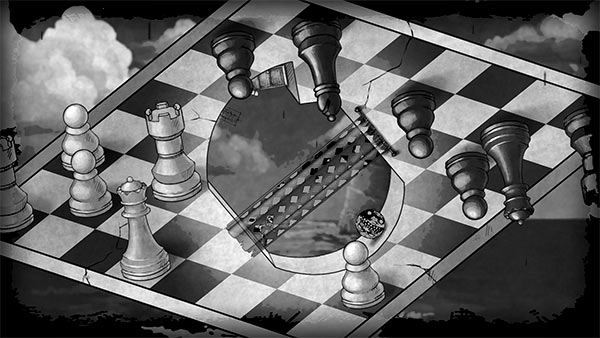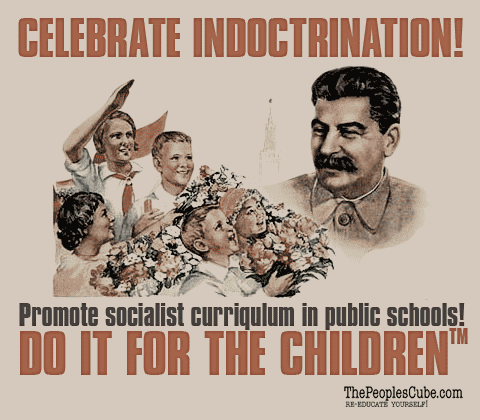What's fairer: kill all capitalists or allow them to profit? (Satire)


I received this question from a long-time Cubist and began to write a short answer. When I stopped writing it was already dark, Mrs. Red Square was sleeping, and I was looking at a pretty long rant that I thought deserved to be shared with the kollektive. Perhaps you can post your short answers as well.
Greetings Red Square,
A good friend of mine and I were discussing something earlier today and we reached an impasse. He listened to a speaker who said that a laissez-faire capitalist system can't function as a closed cycle because it can't truly generate additional wealth. The speaker used this scenario.
Imagine a closed-cycle economy, where no outside forces (e.g. the government or a foreign nation) have any influence. You are an entrepreneur and your company spends $1 billion in material and labor to make a specific product. Of course, you won't sell it just to break even, you expect a profit. You want to sell the resulting product for $1.1 billion. The crux of the speaker's argument is since the asking price is greater than the cost of the production price, this additional 100 million has to be gotten from somewhere. In a closed-cycle economy that means others would have to purchase this product at a loss.
The speaker then goes on to talk about printing money, but that can only be done by the government, which contradicts his own scenario. He then claims that the laissez-faire capitalist system would have to make up that deficit through non-capitalist means, such as uncompensated labor and stealing from other nations.
Can you provide any insight on this matter? Maybe there's something we both missed.
Commissar Elliott

Dear Elliott.
I'm not an economist, but it seems right off the bat that your speaker (let's call him Karl) is toying with a false premise.
Karl's hypothetical is absurd for the following reasons:
1. It isn't much different from testing the sustainability of humanity by isolating a group of people and requiring them to eat their own waste and drink their own urine. They won't last long because their waste won't contain enough nutrients to keep them alive. And if some of them survive after a month, that means they've been stealing or eating human flesh. Practical conclusion: humanity is unsustainable and therefore it is doomed. Moral conclusion: humanity is evil and isn't worth saving.
This conclusion is just as absurd as the Marxist conclusion that capitalism is doomed because it isn't sustainable. Both theories discount the natural cycle of life on earth.
2. This hypothetical is premised on a static view of the economy, whereas laissez-faire capitalism is dynamic and any attempts to render it static will stifle and kill it. Presenting laissez-faire capitalism in a static closed-cycle situation is the same as saying: imagine a human who is not breathing, not moving, and is of room temperature. How much work can this human do? None. Conclusion: humans are useless.
But the costs in the free markets are never carved in stone; they are spontaneously balanced by supply-and-demand mechanisms. Should there be a disruption, the same mechanisms will readjust the costs and establish a new balance.
Laissez-faire capitalism is about free choices. A business that doesn't bring profit has a choice to close its doors. The workers have a choice to save their jobs by agreeing to pay cuts. The suppliers have a choice of lowering their prices to keep this customer buying their products. And so on, until the free markets readjust to the new situation and reach a balance with lower prices matching a lowered standard of living. But since the free market systems have a natural tendency to grow, the prices, the salaries, and the standard of living will eventually rebound. That's until the next genius comes along and messes with the system to prove that capitalism is unworkable.
3. Laissez-faire is antithetical to closed cycles. Karl may as well have asked, what if the polar ice caps were on the equator. Then they would no longer be ice caps - just like anything in a closed cycle would no longer be laissez-faire capitalism.
Just how "closed" is that closed cycle? All the people involved must live somewhere, so there has to be a housing industry. They must eat, so there has to be agriculture, food processing, and restaurants. They must have clothes, so there has to be clothing manufacturers. People must be able to buy all the above, so there have to be retail stores. People also need entertainment, healthcare, and education for their children. All these businesses live off and nourish each other, in the process generating wealth for their owners and employees through the work of their minds and their hands. So any artificially created closed cycle will soon stop being closed, with the market forces remaking a static situation into a dynamic one, with enough circulated wealth to support growing profits.
4. Karl brings zero-sum rules to a non-zero sum game. A zero-sum game precludes growth, dealing with ways to distribute a limited, static supply of resources: the more one takes, the less is left for the others. Socialism is such a zero-sum game, and so socialists tend to think in zero-sum terms.
In contrast, capitalism generates wealth and abundance of products, which makes it a non-zero-sum game: one can have more things without taking them away from others. Trying to play this game by different rules is like bringing a baseball bat to a poker table.
5. Karl seems to be promoting the Marxist concept of "surplus value," which equals the new value created by workers in excess of their own labor-cost, and then greedily appropriated by capitalist "exploiters" as profit when products are sold. Karl's hypothetical implies that things in a closed cycle would still work if the capitalists weren't trying to steal the "surplus value" from the workers. Such a view treats businesses as a given natural resource, as opposed to the product of human efforts created explicitly to bring profits.
Profit is the main motivator for businessmen to take risks; it is also their resource to innovate, research, and expand, which creates new and better jobs for others. If no profit can be made, why build new businesses? One would rather have a risk-free life as an employee at an existing business, expecting a guaranteed paycheck every two weeks.
Marxism concept of "surplus value" being stolen from workers as capitalist profits leads to the concept of "exploitation" of man by man - an injustice that can only be remedied by a socialist revolution, a workers' dictatorship, and elimination of private property of the means of production.
This fallacy has already caused a catastrophic loss of life and destruction of property in the name of "economic justice" around the world. And yet we still call its proponents "well-meaning idealists," allowing them to take over the nation's schools and teach our children.
The next time one of them questions the workings of capitalism, we should go straight to the basics and ask them if they believe it is more just and fair to murder capitalists than to allow them to make a profit.
Hope this helps,
Red Square
People's Director
Tags

[]



Professor Quiet
1
seeder
sixpick
8 years ago


